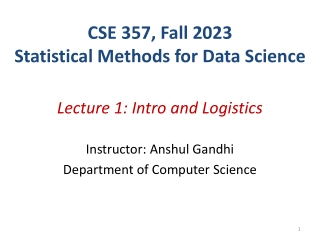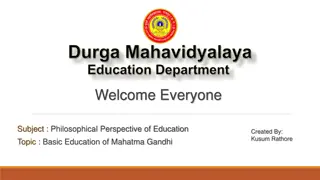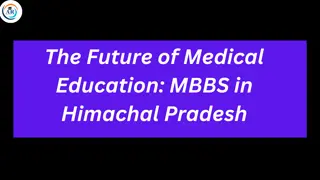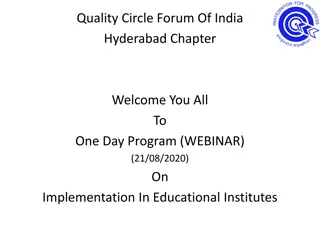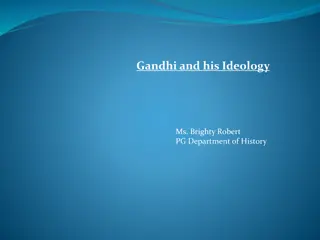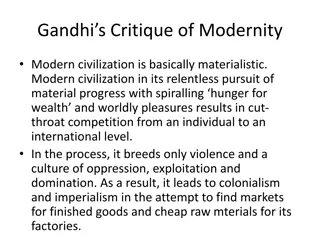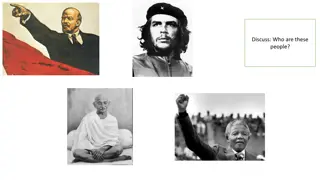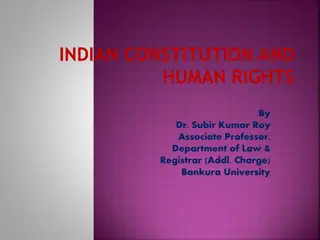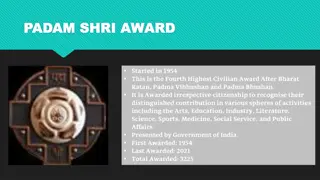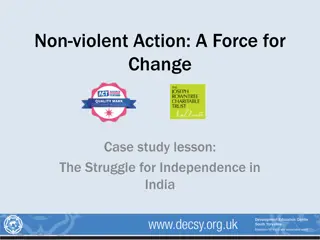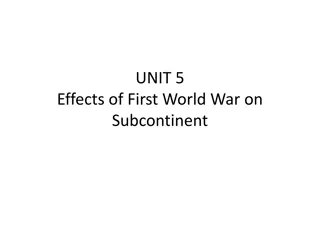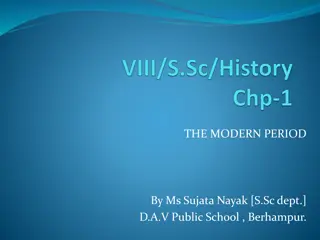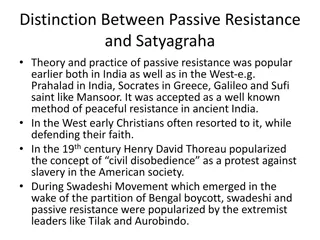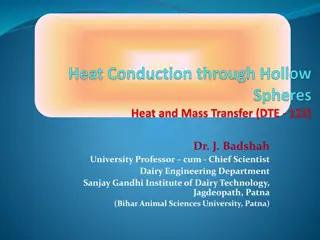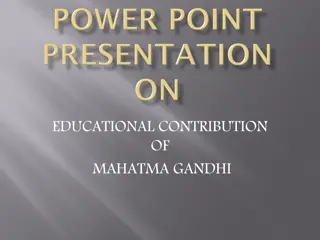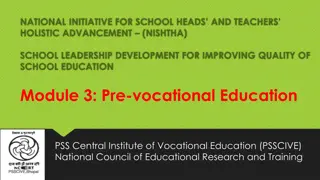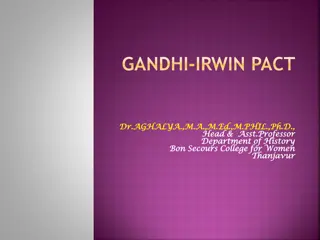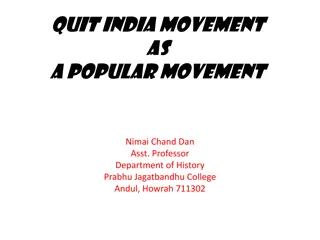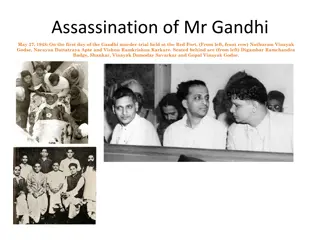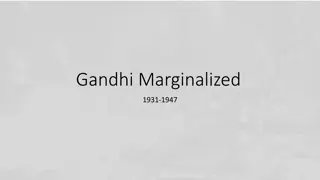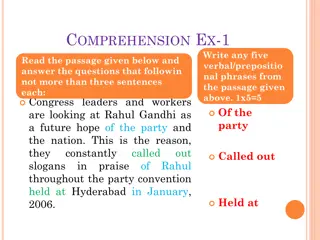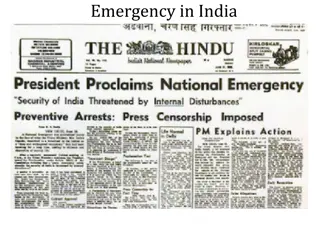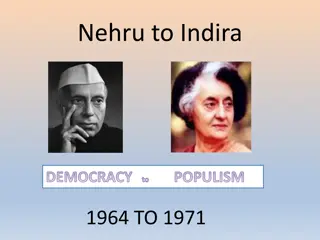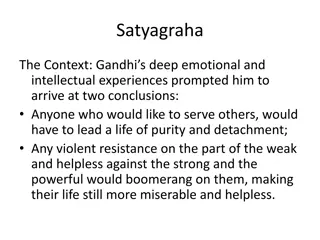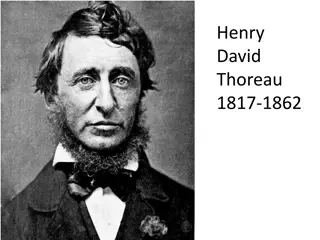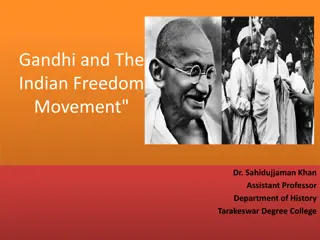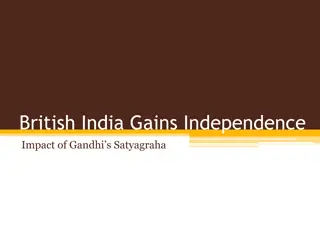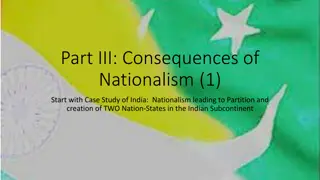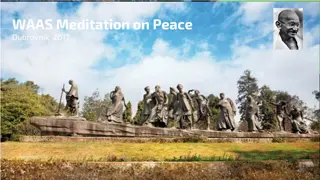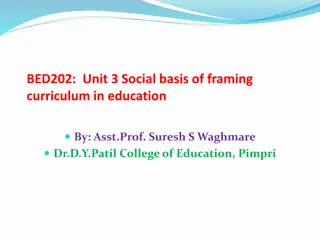CSE 357, Fall 2023 Statistical Methods for Data Science
Learn about the basics of data science, statistical analysis, and computer science in this introductory course. Taught by Anshul Gandhi from the Department of Computer Science.
5 views • 33 slides
Understanding Nationalism: India's Road to Independence
Explore the journey of India towards independence, driven by the rise of nationalism under British colonial rule. Learn about key figures like Mohandas Gandhi and the Indian National Congress in the fight for equality and liberation. Discover the impact of nonviolent protests and the sacrifices made
0 views • 32 slides
How to avail National Old Age Pension Scheme (IGNOPS) in TN
The Indira Gandhi National Old Age Pension Scheme (IGNOPS) is a government-approved retirement plan that ensures a monthly pension for government employees who have served for a minimum of ten years. The calculation is based on their final basic salary and years of service. \nTO know More: \/\/obcr
3 views • 5 slides
Durga Mahavidyalaya
Education is viewed as the acquisition of knowledge, skills, beliefs, and moral habits. Mahatma Gandhi introduced his Basic Education concept emphasizing free and compulsory education, mother tongue instruction, craft-centered learning, moral education, and character building. The curriculum include
0 views • 6 slides
The Future of Medical Education: MBBS in Himachal Pradesh
Examining MBBS in Himachal Pradesh offers a mix of quality instruction, quiet environment, and cutting edge offices. With legitimate teachers like Indira Gandhi Restorative College, Dr. Rajendra Prasad Government Medical College, and Maharishi Markandeshwar College, the state gives plentiful opening
1 views • 4 slides
A Comprehensive Guide to MBBS Admission in Uttar Pradesh
Seeking an MBBS in Uttar Pradesh offers a mix of quality instruction and diverse clinical exposure. The state has renowned teachers like Lord George's Medical College and Sanjay Gandhi Postgraduate Established Medical Sciences. With a blend of government and private colleges, students take advantage
1 views • 5 slides
Quality Circles in Education: Implementation and Success Stories
Explore the journey of implementing Quality Circles in educational institutes, with a focus on methodology, experiences, and case studies. Learn from pioneers like Dr. Jagdish Gandhi & PVP Siddardha Institute of Technology. Discover how Japanese management techniques are reshaping American higher ed
2 views • 48 slides
Mahatma Gandhi and His Ideology in Indian History
Mahatma Gandhi, a pivotal figure in India's freedom struggle, advocated for non-violence, truth, and self-realization. He reshaped the Indian National Congress and empowered the masses to fight against injustice through civil disobedience. Gandhi's ideologies of swadeshi, local democracy, and truste
0 views • 28 slides
Gandhi's Critique of Modernity: A Thoughtful Analysis
Gandhi's critique of modern civilization delves into the materialistic nature of modernity, highlighting its detrimental effects on society, individuals, and the environment. He argues that relentless pursuit of wealth and worldly pleasures leads to violence, exploitation, and domination, resulting
0 views • 16 slides
Revolutionaries Throughout History: From Lenin to George Washington
Explore the lives and ideologies of influential revolutionaries such as Lenin, Che Guevara, Nelson Mandela, Gandhi, and George Washington. Dive into their causes, ideologies, use of violence, and desire for change, drawing parallels between them and assessing their impact on history.
0 views • 16 slides
Exploring 'Kanthapura': A Journey into Indian Freedom Struggle through Literature
Indian author Raja Rao's novel 'Kanthapura' portrays the impact of Gandhi's freedom movement in a small village. The story follows Moorthy, a passionate follower of Gandhi, as he spreads the message of nonviolent resistance. This groundbreaking work blends traditional folk tales with modern literary
0 views • 12 slides
Indian Constitution and Human Rights: A Comprehensive Overview
The Indian constitution embodies justice in social, economic, and political spheres, aiming for the full development of every individual. Rooted in democratic principles and socialism, the preamble emphasizes liberty, equality, and justice. Drawing wisdom from leaders like Dr. Ambedkar and Mahatma G
0 views • 10 slides
Understanding Energy Analysis in Size Reduction Equipments
This comprehensive overview delves into the energy analysis involved in size reduction equipment, exploring topics such as objectives of size reduction units, sieve analysis for particle size distribution, mesh number system, and mathematical models for energy analysis in size reduction units. Dr. J
0 views • 11 slides
Recognizing Excellence: India's Prestigious Awards
Discover the significance and history of notable Indian awards like the Padma Shri, Arjuna Award, Rajiv Gandhi Khel Ratna Award, Dronacharya Award, Dhyan Chand Award, and Maulana Abul Kalam Azad Trophy recognizing outstanding contributions in various fields.
0 views • 12 slides
Non-Violent Action for Independence: The Indian Struggle
The struggle for independence in India against British rule led by Gandhi through non-violent action, focusing on the Salt March and defiance of the British Salt Act. The movement aimed to unite Indians across communities and regions towards self-rule, highlighting the power of non-violence as a for
0 views • 20 slides
Effects of First World War on Subcontinent
World War I, also known as the Great War, had significant negative impacts on the Indian subcontinent. Indians faced difficulties on the home front due to massive recruitment efforts, high taxes, and price hikes. The war led to a drain of wealth, food shortages, and a fall in the standard of living.
0 views • 7 slides
Modern Period of Indian History: From Mughal Decline to Independence
The modern period of Indian history began in the 18th century after Aurangzeb's death, marked by British colonization and the struggle for independence led by key figures like Gandhi. Sources like British documents, books, and speeches provide insights into this transformative era.
0 views • 11 slides
Comparison between Passive Resistance and Satyagraha Theories
Passive resistance was used historically by figures like Gandhi, Thoreau, and early Christians for peaceful resistance. Satyagraha, introduced by Gandhi, differs by being a weapon of the strong focusing on love, self-realization, and unity rather than opposition and physical force. It emphasizes spi
2 views • 11 slides
Understanding Heat Conduction Through Hollow Spheres in Dairy Engineering
Dr. J. Badshah, a University Professor cum Chief Scientist at Sanjay Gandhi Institute of Dairy Technology, explains the conduction through hollow spheres with varying thermal conductivity. The concept of logarithmic mean area for hollow spheres and solving numericals related to conduction through a
1 views • 6 slides
Educational Contribution of Mahatma Gandhi: A Philosophical Perspective
Mahatma Gandhi's educational philosophy emphasized holistic development through literacy and craft-centered curriculum, transforming traditional education into a blend of hand, head, and heart. His approach focused on instilling values of social responsibility and practical skills. Gandhi's scheme i
0 views • 25 slides
Importance of Pre-Vocational Education in School Curriculum
Explore the historical perspectives and objectives of pre-vocational education in India, emphasizing the integration of work-based learning in school programs. Delve into Mahatma Gandhi's vision for incorporating manual work in education and the significance of vocational education in national polic
0 views • 33 slides
Gandhi-Irwin Pact and Its Significance in Indian History
The Gandhi-Irwin Pact, signed in 1931, was a pivotal moment in India's independence movement. It marked a shift in British-Indian relations and led to the withdrawal of civil disobedience movements. The pact included agreements on the Round Table Conference, withdrawal of ordinances, prosecution, an
0 views • 11 slides
Overview of Quit India Movement and its Phases
The Quit India Movement was a significant event in India's struggle for independence, marked by various factors leading to its emergence, including the demise of the Civil Disobedience Movement and the rise of nationalist sentiments. The movement escalated in response to the outbreak of World War II
1 views • 9 slides
The Assassination of Mahatma Gandhi and the Trial of the Conspirators
The assassination of Mahatma Gandhi on January 30, 1948, by a young Hindu extremist sent shockwaves through India. The trial of the accused conspirators, including Nathuram Godse and Narayan Apte, resulted in eight convictions, with Godse and Apte being hanged for the murder. The incident marked a t
0 views • 11 slides
Gandhi's Marginalization in Indian Nationalist Politics from 1931-1947
The 1930 Salt Satyagraha propelled Gandhi into the heart of nationalist politics, challenging colonial rule. However, by the end of the decade, the tide shifted away from his influence towards a more conventional political landscape dominated by power negotiations and elections, leading to Gandhi's
4 views • 11 slides
Rahul Gandhi: Hope of Congress and the Nation
Congress leaders and workers see Rahul Gandhi as a promising figure for the party and the country, with slogans praising him raised at a party convention in Hyderabad in 2006. During his speech, Rahul emphasized the need to stay true to the party's ideology and work together to strengthen both the p
0 views • 6 slides
Emergency Provisions in the Indian Constitution: A Historical Overview
The emergency provisions in the Indian Constitution, including National/War Emergency under Article 352 and Constitutional Emergency in States under Article 356, have had significant historical implications. The period of Emergency declared from June 25, 1975, to March 21, 1977, during Indira Gandhi
0 views • 7 slides
Henri Cartier-Bresson: Master of The Decisive Moment
Henri Cartier-Bresson, a renowned French photographer, is celebrated for his pioneering work in street photography and capturing the essence of significant moments. From co-founding Magnum to documenting Gandhi's funeral and the Chinese Civil War, his images reflect humanity's pulse. His iconic publ
0 views • 20 slides
Grammar Exercises for B.A. 1st Semester at Rajiv Gandhi University
This content provides a series of grammar exercises for B.A. 1st-semester students at Rajiv Gandhi University. It includes various fill-in-the-blank questions and corresponding answers to help students practice verb forms, sentence structures, and grammar rules. The exercises cover topics such as ve
1 views • 18 slides
Inspiring Quotes on Knowledge and Learning
Explore a collection of inspiring quotes from Chinese proverb, Socrates, and Mahatma Gandhi emphasizing the importance of continuous learning, humility in knowledge, and cherishing wisdom. These quotes remind us that learning is a lifelong journey that enriches the mind and soul, encouraging us to l
0 views • 12 slides
Political Dynamics and Challenges During Nehru and Indira Gandhi's Tenure
The period from Nehru to Indira Gandhi's leadership saw significant shifts in Indian politics. The Syndicate, comprising party bosses from Nehru's time, played a crucial role in decision-making. Lal Bahadur Shastri faced challenges like Naga insurgency, language debates, and the 1965 war with Pakist
0 views • 13 slides
Understanding Satyagraha: Gandhi's Nonviolent Resistance
Gandhi's concept of Satyagraha emphasized truth and nonviolence, leading to passive resistance against injustice. Rooted in purity and detachment, Satyagraha uplifts both the oppressed and oppressors, offering a dynamic and powerful means to confront evil without bitterness or revenge.
0 views • 6 slides
Indigo: A Story of Gandhi's Struggle for Justice in Champaran
Louis Fischer narrates the inspiring tale of Mahatma Gandhi's fight against the unjust practices forced upon the poor peasants of Champaran. Through nonviolent civil disobedience, Gandhi successfully challenges the exploitative British landlords, leading to a significant victory for the oppressed fa
0 views • 9 slides
Influence of Thoreau's Civil Disobedience on Gandhi and Martin Luther King Jr.
Gandhi's encounter with Henry David Thoreau's essay "Civil Disobedience" while in jail in South Africa sparked his implementation of nonviolent resistance called Satyagraha. This powerful concept of refusing to cooperate with injustices was adopted by Martin Luther King Jr., who considered Thoreau's
0 views • 22 slides
Movements for Independence and Rebuilding Nations
Explore the concepts of nationalism, independence movements in India and Vietnam, the leadership of Mohandas Gandhi, and the role of the United States in rebuilding Japan after WWII. Learn how these events shaped history and impacted global politics.
0 views • 14 slides
Mahatma Gandhi and the Indian Freedom Movement
Mohandas Karamchand Gandhi, also known as Mahatma Gandhi, played a pivotal role in India's freedom movement with his philosophy of nonviolence and civil disobedience. Born in 1869 in Porbandar, Gujarat, Gandhi's experiences in South Africa and return to India in 1915 shaped his activism. He led move
0 views • 11 slides
Impact of Gandhi's Satyagraha on British India's Independence Struggle
Gandhi's principles of Satyagraha, emphasizing civil disobedience and non-violence, played a crucial role in India's fight for independence from British colonial rule. His leadership and methods such as boycotts and peaceful protests garnered international support, pressuring the British government
0 views • 18 slides
The Marginalization of Gandhi in India's Nationalist Movement
Explore how Gandhi's approach to nationalism in India, focusing on inclusive mass movements and power-sharing, led to his marginalization within the nationalist discourse, ultimately influencing the partition and creation of India and Pakistan as separate nation-states. Despite his significant role,
0 views • 13 slides
The Inspiring Story of Gandhi's 1930 Salt March in India
Gandhi's 1930 Salt March in India was a powerful act of nonviolent resistance against British colonial rule. By defying the salt tax, Gandhi united millions of Indians and inspired a wave of civil disobedience that ultimately led to India's independence. This iconic event not only symbolized India's
0 views • 9 slides
Perspectives on Education: Dr. Ambedkar and Gandhi's Views
This text delves into the social basis of framing curriculum in education, exploring the values in the Indian Constitution reflected in secondary education. It discusses Dr. Ambedkar's and Gandhi's views on secondary education, emphasizing objectives like character building, self-discipline, and inc
0 views • 30 slides
